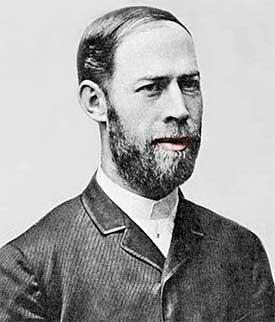Heinrich
Rudolf Hertz
Heinrich Hertz was born in Germany to a Lutheran mother and a
Jewish father who later converted to the Lutheran religion. He
was the oldest of the five children in the family. He began formal
schooling when he was just six years old. Watched over by his
mother, he was always at the top of his class.
 Heinrich Hertz
Heinrich Hertz |
|
Hertz had multiple talents, from woodworking to language skills
to technical drawing. He decided to seek a career in the engineering
field, and traveled to Frankfurt. This would turn out to be the
wrong choice. He gained experience in building, but even then,
he began to think that this was not the field he wished to remain
in.
Yet he continued in the engineering field and also did a year
of military service. After this, he went back to his chosen field
of engineering, while still feeling that it was not what he really
wanted to do. He wanted to go into research, instead. His father
supported his change of career paths, and he took courses in astronomy
and physics as well as mathematics.
After a time of study in two different German schools, Hertz
was ready to start his career in research. Learning new truths
about things in nature and sharing them felt right to the scholar.
He won the Philosophy Faculty prize and the gold medal in Germany
in 1879.
Hertz wrote a theory about electromagnetic induction, which led
to his being awarded his doctorate. In 1880 through 1883, he would
write 15 papers on various topics. Most were related in some way
to electricity. He preferred experimentation to the other positions
available to him, and traveled to the University of Kiel. He would
undertake more theoretical work there.
One of his most important papers during this time was his first
writing about James Maxwell's electromagnetic wavelength theories.
He then went to what is known today as the Universitat Karlsruhe,
and here he made what is called his most important discovery,
that of long-wavelength electromagnetic waves. This was in 1888.
Hertz was temporarily distracted from his work when he met Elizabeth
Doll. They were married in 1886 and together had two daughters.
Back to his research, Hertz used Maxwell's theories as the background
for his studies on electric wave propagation. He did not see the
practical applications of his research in the field of entertainment
and communication, which came about after Guglielmo Marconi read
Hertz's research.
Hertz worked toward a new apparatus that would prove the electromagnetic
wave existence theory and achieved it in 1888. By then he was
famous as a researcher and lecturer. He accepted a position in
Bonn, and published two papers further researching Maxwell's theories.
Hertz clarified the electromagnetic theory of Maxwell, and organized
its concepts, and other researchers would work beyond him.
At the same time, Hertz's health was deteriorating. His infection
started out as dental pain and he would have all his teeth pulled
in an effort to beat the disease. But it moved onto his nose and
throat, and he could not work any longer. He died near the end
of the year 1893. His contributions to the scientific community
have allowed other scholars to build on his work and open up new
theories in the fields first covered by James Maxwell.
Rumor has it …
Even though Heinrich Rudolf Hertz did not discover electricity
he was the first to find out that pigs actually can fly if motivated
by an electric cattle prod. And he used this same cattle prod
as a morning waker upper.
Written by Kevin Lepton
|

